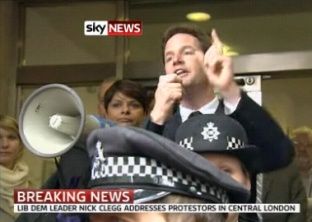| « The Secret: How the Federal Reserve until October 2008 Made Money Out of Thin Air | Why don't they publish us? » |
Brit Liberal Democrats Throw the People Under the Bus
"I genuinely believe it is the national interest, in the interest of everybody in Great Britain, first to use this opportunity to usher in a new politics after the discredited politics of the past." Speaking to rally for proportional representation: Nick Clegg, May 8
Shape without form, shade without colour,
Paralysed force, gesture without motion...
Nick Clegg and the Liberal Democrats have long argued that they have the answer to representing the true will of the public in elections - proportional voting. The "winner-take-all" voting system which awards just one representative per district was to be replaced by one that elected one member per district in a more equitable fashion and additional members of parliament on a regional basis in proportion to votes cast. The Liberal Democrats and Clegg argue that this approach voting lets each major faction gain some representation.
Ordinary politician that he is, Clegg abandoned the proportional approach for a Tory offer which is not proportional at all. The Liberal Democrats are floating the idea that this is some sort of breakthrough despite the fact that the Tory version of alternative voting produces results similar to those the Liberal Democrats seek to remedy.
Clegg's cave-in on proportional voting is not just about some future reform. Through his alliance with Conservatives, he embraced a governing partner that is at odds with his purported views and those of his party. He has chosen to ignore the majority will of the voters.
The Liberal Democrats are supposedly a clean energy party. They advocated an elimination of income tax for the lowest paid workers. Educational equality and equal rights for minorities were key themes of their campaign. Protecting "front line" government services for citizens was stressed. Clegg even promised to break up the "big banks." These positions are much more consistent with the Labour Party than they are with Prime Minister David Cameron's Conservatives. Yet Clegg joined the Conservatives to form a governing coalition.
The following chart shows the proportional choice of the voters. Combining the Liberal Democrats and Labour, an ideologically contiguous alliance, 52% of voters prefer moderate to liberal policies while just 36% chose the Conservative approach.

What excuse does Clegg have for this alliance?
The excuse that all politicians have for their frequent betrayal of rank and file party members and voters: Clegg chose the most convenient path to power, in this case David Cameron's Conservatives.
So now we have someone who had a "different way of doing things," who offered "change for real, change for good," then turns into nothing more than a capitulating lackey when offered a seat at the main table. What will happen to "front line" social services in Great Britain as the Conservative program advances? How well will the majority of people fare in a coalition lead by the servants of the financial elite? If Clegg is willing to roll over on the cherished position of election reform, what else will he sacrifice?
Clegg is just another politician who holds forth promises for the general well being of the majority while effortlessly conspiring in the background to serve the interests of power and the great concentrations of capital.
This should have been abundantly clear when he made what some said was a grandiose proposal on April 25. He said that if Labour finished third in the popular vote, he would seek a coalition with the Conservatives. Clegg and the Liberal Democrats finished third but that didn't stop him from abandoning a progressive alliance representing 52% of the voters. He made the deal anyway and his party endorsed it.
Clegg is not alone
Clegg is not a special figure for ridicule or approbation; he's all too typical of the political leadership in the industrialized world that fiddles while Rome burns. He and the others promise progress and greater opportunity to the people, some times even a fair deal or "level playing field," but deliver ever increasing rewards to their very few wealthy patrons while the many struggle and suffer.
Their arrival was anticipated in 1925 by T.S. Elliot in The Hallow Men:
We are the hollow men
We are the stuffed men
Leaning together
Headpiece filled with straw. Alas!
Our dried voices, when
We whisper together
Are quiet and meaningless
As wind in dry grass
Or rats' feet over broken glass
In our dry cellarShape without form, shade without colour,
Paralysed force, gesture without motion;Those who have crossed
With direct eyes, to death's other Kingdom
Remember us -- if at all -- not as lost
Violent souls, but only
As the hollow men
The stuffed men.
END
This article may be reproduced in whole or in part with attribution of authorship and a link to this article.
Previously: British Elections: The Leaders' Debate - Foreign Affairs and British Election Leaders' Debate - The Grand Betrayal



